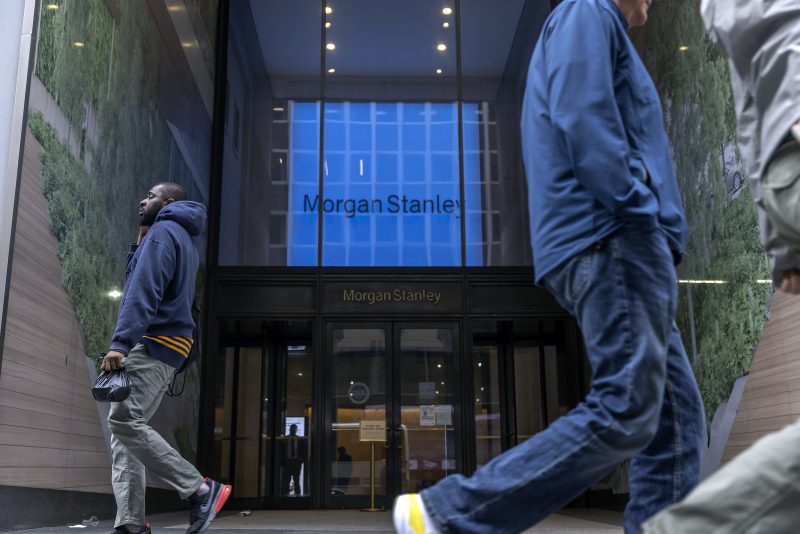A former Morgan Stanley financial adviser has been sentenced to more than seven years in prison after admitting he ran a $7 million Ponzi scheme at the firm for more than a decade.
But even though the scam targeted Morgan Stanley clients and the adviser admitted using a Morgan Stanley product to carry it out, the firm has fought efforts to hold it responsible.
Victims say not only has Morgan Stanley resisted their efforts to recover money from the firm, it is also continuing to hold them responsible for lines of credit that the adviser fraudulently convinced them to open. Morgan Stanley is America’s sixth-largest brokerage firm, with more than $1.3 trillion under management. The firm made $11 billion in profits last year.
“I can liken the whole process to being assaulted in a back alley while you’re on mind-altering drugs like roofies,” said Caitlin Andrews, 43, of Carolina Beach, North Carolina, a single mother of two boys who lost $1.7 million, or virtually her entire net worth. “And then one day you wake up in the police station and you have to watch the video again and again and go over bank statements of when things happened and listen to phone calls again and again. It’s traumatizing.”
The adviser, Shawn Edward Good, was a vice president in Morgan Stanley’s Wilmington, North Carolina, office from 2012 until early last year, when he was abruptly fired after the scam came to light. Last September, he pleaded guilty in federal court to one count of money laundering and one count of wire fraud.
Prosecutors said that Good, 56, conned at least a dozen clients into paying him more than $7.24 million that they thought was going toward “low risk” investments. Good instructed them to borrow against their portfolios using a Morgan Stanley product known as a Liquidity Access Line of Credit, transfer the money to him and he would take care of the rest.
Fraudulent transfers
Shawn Good, a former Morgan Stanley broker.CNBC
“Access the cash you need to fund your goals, with the strength of Morgan Stanley behind you,” says a corporate video touting the Liquidity Access Line of Credit.
But instead of investing the funds as promised, Good spent the money on homes, luxury cars, European vacations and payments to multiple women. Investigators found electronic money transfers with memo lines such as “Hotel for Destiny,” “because youre [sic] sexy” and “Nailz.” By the time the scam came to light in 2022, he had racked up $800,000 in credit card bills, according to court filings.
“Shawn Good spent that money to prop up a lavish lifestyle,” Michael F. Easley Jr., U.S. attorney for the Eastern District of North Carolina, said in an interview. “It was a hallmark of somebody who every single day of their life chose greed over good.”
The use of the Morgan Stanley lines of credit gave the transfers an air of legitimacy.
“So, effectively, Morgan Stanley is lending money to the victims of this scheme and that money then gets diverted into Shawn Good’s pocket,” Easley said.
But it also meant that while they were unwittingly funding Good’s scam, the victims also were on the hook for interest to Morgan Stanley for as much as $2,000 per month.
“Shawn Good convinced them he would get enough return that he could make money and pay back his liquidity access loan principal and interest and still come out ahead,” Easley said. “That didn’t happen.”
Prosecutors said that in addition to the money he spent on himself, Good used some of it to pay other investors, in a classic Ponzi scheme.
On May 24, a federal judge in Raleigh sentenced Good to 87 months in prison and ordered him to pay more than $3.6 million in restitution. It’s not nearly enough to make the victims whole, prosecutors and victims said. And because of the nature of the scam, much of the money Good pilfered is long gone.
A question of supervision
That is where Morgan Stanley comes in. Some of Good’s clients filed arbitration claims against the firm — standard account agreements bar brokerage customers from suing in court. The victims alleged that the firm failed to reasonably supervise its employee.
“I think any other brokerage firm would have detected this activity,” said attorney Marc Fitapelli of New York, who represents Andrews and her mother. Andrews’ mother also lost everything she had, roughly $1 million.
The arbitration process, under the auspices of the Financial Industry Regulatory Authority, is confidential. While the firm settled with at least one client under undisclosed terms, Fitapelli said Morgan Stanley has pushed back against claims that it was somehow responsible for Good’s actions. And several of Good’s victims said the firm is still holding them to their lines of credit, and it is still charging them interest.
One victim, Charles Hayward of Wilmington, said that means he has no choice but to keep his account at Morgan Stanley to this day.
“It’s awful hard to pay that debt off to move my money away, or I just give them all my money and then move whatever’s left away,” he said.
According to a court filing, Hayward lost $150,000 in the scam.
Morgan Stanley, which topped earnings expectations Tuesday thanks in large part to its wealth management business, declined an interview request. In a statement, a spokesperson for the firm said: “After discovering Mr. Good’s fraud, he was promptly terminated from Morgan Stanley. We have and will continue to cooperate fully with law enforcement and other authorities and to work with counsel for Morgan Stanley clients to address their claims.”
It wasn’t Morgan Stanley that discovered Good’s fraud, according to multiple law enforcement sources. These sources said that federal and state investigators in North Carolina, who were looking into Good’s finances, began contacting his clients early last year. One of those customers was the first to alert the firm. Only after Good refused to be interviewed by investigators did Morgan Stanley fire him.
After this article was first published, a Morgan Stanley spokesperson offered an additional statement.
“The fraud committed by Shawn Good was conducted outside Firm systems and involved transfers to Good that were made from client accounts held elsewhere,” the statement says.
Nonetheless, the statement says, the firm “has worked with all clients who have raised claims to amicably resolve them.”
Earlier this month, the firm reached an agreement in principle with Caitlin Andrews and her mother to settle their claims.
Trading on trust
Caitlin Andrews said she began investing with Good in 2014, opening her Morgan Stanley account with approximately $1.7 million from a divorce settlement. She said that she saw no reason not to trust him. Good was already handling her mother’s investments, and before that he had worked with her grandmother.
“He just seemed really invested in our family,” she said. “He just seemed very trustworthy and friendly.”
But more important than all of that, she said, was that he worked for Morgan Stanley.
″Morgan Stanley does the homework about who they hire,” she said. “And he isn’t just some guy on a street corner with a sign.”
Caitlin Andrews, a Morgan Stanley client.CNBC
Andrews said that she stressed to Good from the outset that the money was everything that she had. As a single mother, her earning power was limited.
“It’s what I lived off of, it’s what I paid groceries off of, it’s what I paid my mortgage off of,” she said, explaining what she told Good. “It was my sons’ college education, it was health insurance, it was everything.”
Eventually, she said, Good pitched her on a plan that would allow her to leverage her holdings to invest in an Airbnb in her beach-side community, earning her extra income with minimal risk.
“I’ve got a high yield, low risk bond that pays out every three months. So, in three months, you’re going to get $15,000 and that would be great for this bathroom,” she said he told her. “And then in the next three months, $15,000 will be great for, you know, that kitchen upgrade.”
Good would arrange for the purchases through her Liquidity Access Line of Credit. What she said she had not understood, as a novice investor, was that the funds for the bonds were going from her line of credit into Good’s personal account.
The scam unravels
It wasn’t until early last year that she had any idea something was wrong. That’s when investigators from the IRS and the North Carolina State Bureau of Investigators contacted her about the money transfers from her brokerage account to Good.
“I remember one of the women was really nice, and she said, ‘Do you know that you are missing X amount of money?’” Andrews recalled. “And I said, ‘No, I’m not.’”
She said she then pulled up her account on her phone, and it showed her holdings were still there. But then the agent instructed her to scroll down to the section about her line of credit.
“If you go down to how much I owed, no, I didn’t have any money,” Andrews said. At that point, the agent started crying, she said. “And I knew that when the law enforcement agent starts crying on your behalf, that things are really bad.”
‘I want my money’
Filled with adrenaline and confusion, Andrews said she decided to confront Good and record the whole thing. The phone conversations would eventually become part of the court record.
“How do we know it’s not a Ponzi scheme?” she is heard asking Good on Feb. 2, 2022.
“It’s not! I mean, I mean, the money’s there. It’s coming back. It’s not,” he said.
“OK, and I’m going to trust you because you work at Morgan Stanley. And you should know these things,” Andrews replied.
But by this point, Good was no longer touting his Morgan Stanley credentials. That became even clearer in Andrews’ second phone call to Good a week later.
“I want my money. And I want it in my hands,” Andrews told Good on Feb. 9, 2002. “I have two boys. I am their only parent. This is all of my money. And you took it!”
“And you have it all, Caitlin. You have it all, we will get it all transferred back,” Good replied.
But, he said, “If they go to Morgan Stanley, they will fire me. I mean, I will lose my job.”
On the recordings, Good can be heard telling Andrews that going to the firm, or even contacting an attorney, would “hamstring” his efforts to get her money back. And in the recordings he is heard instructing her to correspond with him using a private email address and not his Morgan Stanley account.
Reading the red flags
Good’s efforts to hide his scam from Morgan Stanley do not absolve the firm, said Louis Straney, a 43-year veteran of the securities industry who consults in arbitration cases but isn’t involved with this one.
“They should have detected it and prevented it at the outset,” said Straney, the founder and managing partner at Arbitration Insight in Santa Fe, New Mexico. “They should have been more proactive. Because the red flags, the alerts were there.”
According to court filings, Good’s cars included a 2010 Lexus RX350, a 1997 Porsche Boxster, a 2019 Tesla Model 3 and a 2018 Alfa Romeo Stelvio. His travel destinations included France, Italy, Spain, and the Netherlands. Straney said Good’s lifestyle alone should have been a dead giveaway.
“As a supervisor, you’re looking at the advisers that work for you and determining whether or not their lifestyle matches their income,” he said. “I managed some of the best and largest producers at my firm, and none of them had a lifestyle that matched this, not one.”
The fact that virtually all of Good’s clients had opened lines of credit and they were actively using them was a second red flag.
“You really have to justify why they’re borrowing,” Straney said.
Under the radar
It was also not the first time that employees went behind Morgan Stanley’s back using unofficial channels, and the firm failed to notice.
Last year, the firm paid a $125 million fine to the Securities and Exchange Commission after admitting to the “widespread and longstanding failure of Morgan Stanley employees throughout the firm” to follow rules prohibiting “off-channel communications” on personal devices and messaging apps as far back as 2018, following an investigation that began in 2021.
Morgan Stanley was among 16 firms charged, all admitting they violated federal securities laws. Specifically, the SEC said that communicating outside of official channels violates recordkeeping provisions of the law, thwarting the agency’s ability to guard against fraud.
Fitapelli said that meant the firm was already on notice about the same kind of conduct Good was engaging in.
“The activity that they’re being fined for is exactly what happened,” he said. “And, so, the harm is foreseeable.”
Sense of abandonment
Caitlin Andrews was Good’s biggest victim, according to court filings.
She said the fraud upended her life. She was forced to move with her boys into the cottage, still under construction, that she had been planning to turn into an Airbnb. With no money to pay her contractors, she is trying to do the construction by herself, bit by bit. The family has no health insurance and with no money for child care, she can’t work a full-time job.
“The stress on me is understandable. But what I hate is the amount of stress on my kids,” she said. “I try to be strong. I think I am strong, and I try to talk about it, not cover it up, but at least not let it bleed into everything. But the children know exactly what’s happening and how their life has changed.”
Andrews said that at one point, she even considered suicide, and was saved only by her love for her children, as well as a therapist who insisted on treating her for free.
“You’re just in this dark void of empty abandonment, because you’re abandoned by your financial adviser who took everything. You’re abandoned by the firm whose commitment is to help you,” she said.
At his sentencing hearing in May, a disheveled-looking Good said “there’s no excuse” for what he did, and that “the guilt and remorse is overwhelming.”
Several of his victims spoke at the sentencing, as well, all describing how Good stole not only their money but also their trust.
“He took my boys out for ice cream while he was stealing their college funds,” Andrews told the judge.
Not in court, nor anywhere near it, was anyone from Morgan Stanley.
If you or someone you know is in crisis, call 988 to reach the Suicide and Crisis Lifeline.


































